The Critical Guide to
the Warren Illustrated Magazines
1964-1983
by Uncle Jack
& Cousin Peter
 |
| Maroto |
"Shrivel" ★★★
Story by Bob Toomey
Art by Val Mayerik
"Night Life" ★★
Story by Bob Toomey
Art by Rafael Auraleon
"Dime Novel Hero!" ★★★★
Story by Nicola Cuti
Art by Russ Heath
"Always Leave 'em Laughing!" ★★
Story by Len Wein
Art by Alex Nino
"The Sign" ★1/2
Story by Roger McKenzie
Art by Pepe Moreno
"Visit to a Primitive Planet" ★★★
Story by Bill DuBay
Art by John Severin
"The Summoning" ★1/2
Story by Bruce Jones
Art by Gonzalo Mayo
An overweight dragon named "Shrivel" menaces a "kingdom of unsurpassed wretchedness" and the occupants of said kingdom find there is nothing they can do to stave off the monster's hunger for royal flesh. In the end, Shrivel gobbles up the king and queen and adopts their prince as his new road companion. "Shrivel" is the best kind of mindless fun, with a silly dark edge and some great graphics. I was surprised that it took Val Mayerik so long to cross over into the Warren comics, since his style is so reminiscent of Wrightson. Mayerik's version of the Frankenstein Monster in both color and B&W was a highlight of Marvel's 1970s monster rally.
Clarice has been following Cort around the world for fifty years since she met him in Paris and fell in love with him. Cort must have been quite smitten with Clarice as well since he didn't drink her blood and transform her into a vampiress. But love is blind and Clarice, wishing her beau had given her that bite, finally catches up to Cort in a New York disco. She talks him into coming back to her place, where she opens the drapes to reveal the rising sun. Cort turns to ashes and Clarice mourns what could have been.
"Night Life" is a boring mess. Clarice reveals that she's been following Cort for years, so why did she wait so long to confront him? Bob Toomey never flat out tells us Cort is a vampire, but he has all the trappings, so why would he be dumb enough to stay out past dawn? The art, by the usually reliant Auraleon, is all kinds of photoshoppy distracting. That splash looks like three different scenes spliced together.
A cattle baron named Lawson intends to own all of Texas, and if that means killing every settler within its borders, then so be it. Lawson's ace in the hole is that he has employed Kid Lobo (!), an honest-to-gosh werewolf, to scare off any stubborn ranchers. One family that refuses to budge is the Hallidays and, as a result, one of the Halliday sons is murdered and the patriarch is seriously injured by the creature.
Young Luke is convinced that one of his dime novel heroes is the solution to their problem, but anyone in earshot is, to say the least, skeptical. His son's death reduces Halliday to a drunken wretch and Luke and his little sister are sent to fetch Pa back from the saloon. On their way back, they are set upon by the beast. Pa stirs in the wagon and the full moon transforms him into a werewolf (a victim of the attack back on the farm). Pa battles Kid Lobo, but the gunslinger is too much for the rancher and Halliday succumbs to his wounds. Lobo turns his attention to the children but is stopped short by the arrival of... the Lone Ranger and Tonto! The Ranger kills Lobo with his patented silver bullet and heads off into the Wild West to eliminate any other foul lycanthropes in Texas.
A joy to read from beginning to end, "Dime Novel Hero!" is just about the best thing we've had around these parts in many full moons. Only a guess, but it's as though Nick Cuti was reading the same back issues of Creepy as Bob Black (he of "Business is Booming" in last month's Vampirella) and thought a heaping dose of nostalgia was in order after all the crappy vampire and robot stories we'd been subjected to over the last couple of years. This is the best Russ Heath has looked since his heyday (in spots it looks a lot like Severin, who would have been my natural choice for artist on a Wild West strip), and the twist is a delight. Of course, I do have to wonder why Pa died from his Kid Lobo wounds, when werewolves are supposed to be immortal, save the silver bullet. David Horne's encyclopedia of Warren trivia and facts, Gathering Horror, drops the nugget that "Dime Novel Hero!" is a rewrite of "The Werewolf Goes West," a two-pager Cuti wrote (and Frank Brunner drew) for The Monster Times #24 in July of '73.
When humor is outlawed, Earth's politicians shove all the clowns into a rocket ship and send them to the moon. But clowns will be clowns, and it's not long before they get up to mischief, setting off explosions all around their village. Fearing the merrymakers are attempting to throw off the lunar tides (or some such scientific nonsense), Earth sends missiles to the moon to destroy Clown Central but, even in death, the clowns make whoopie. The explosions have carved a smiley face on the moon.
About as pretentious as you'd expect when dealing with a script about the outlawing of smiles, "Always Leave 'em Laughing" has only its art and that final panel to recommend it. The Nino visuals are a bit different than his usual jobs; there's still the detail, but his clowns look human! I'm not used to Nino characters without tentacles and multiple sets of eyes. This was probably a shelved script since Len had already moved on to DC and Batman by this time.
Three men stumble across an icy wasteland searching for "The Sign." What they find is confusion, zombies, and the climax to Beneath the Planet of the Apes. As the ice planet explodes, three wise men on Earth see the flash as a "sign." And here's a McKenzie script probably left over from one of the Christmas issues. The Moreno art isn't that bad, but everything going on within the panels is very confusing.
A pair of aliens visit Earth to share loads of scientific discoveries and cool gadgets with a crowd on Main Street but are nonplussed by the lack of enthusiasm on the part of their audience. In fact, these humans don't move a muscle, until one of the visitors touches one and they fall to the ground, stiff as a board. Curious, the aliens wander and find a road sign nearby. Whipping out their Guidebook to Primitive Languages, they decipher the message just as the bomb is detonated at the nuclear site and they are fired to a crisp. Delivered with just a smidgen of preach, "Visit to a Primitive Planet" is a fun and (most important) extremely quick read.
Entomologist Robert Gentry, his scantily clad babe of a wife Jean, and their cuddly dog, Boo, all hop in a motorboat and head into the swamp to study the mating habits of fire ants (or some such nonsense) but run low on gas and sunlight. Boo hops out of the boat to chase a croc and Jean blows the dog whistle, to no avail. Luckily, the couple find a nearby shack occupied by a burly cuss named Hinkle.
The man invites them to stay at his shack, since the swamp can be dangerous at night. He cooks them up some vittles and the three engage in conversation. Hinkle lets drop that he didn't always live alone; his wife died years before during childbirth, but the cause of her death remains a mystery. Her tattered body was found, but the baby was long gone. Hinkle explains that, shortly thereafter, local children went missing and he stumbled upon a ghastly monster in the swamp. It chased him to the shack, but Hinkle was able to hide while the thing ransacked his home for food. Ever since, Hinkle has hung a dead buck outside on the porch now and then to keep the critter docile. Jean innocently asks how Hinkle summons the creature and the man says the only sound the monster can hear is a dog whistle. Ulp!
The shack starts rockin', and very soon the monster is inside and disemboweling the gents. Jean gets away, jumps in the motorboat, and heads downstream, where she finally runs out of gas. Luckily enough, she floats to a stop right outside the ranger station and collapses in the arms of Ranger Rick. When she awakens, the man explains that he'd been going through her things and blowing her dog whistle in an effort to drum up Boo. Ulp!
I was inclined to believe that Bruce Jones wrote this as a parody of big dumb monster stories, but it's so earnest that I doubt that's what was going on. So, it's just a big dumb monster story... and not a very good one. We are to assume that the creature is Hinkle's missing kid, but we're not clued into why it was born misshapen and why it grew so big. At one point, Hinkle says "They say bullets won't stop it..." as if it's some kind of swamp legend, but then why does the vacuous ranger blow the dog whistle? None of this makes any sense. If Jones said it was thrown together at the eleventh hour to fill eleven pages, I'd believe him. The Mayo art is hideous; grade-school amateurish. In a page two panel (reprinted at right), Jean looks as though she's disrobed down to her shredded panties for some reason. The monster has no unique design; it's just a Swamp Thing rip-off. This is one long, ugly strip.-Peter
Jack-I also thought "Dime Novel Hero!" was excellent. I loved the surprise appearance of the Lone Ranger and Tonto! Severin's art made "Visit to a Primitive Planet" work for me, though I thought DuBay was kidding with the first few pages of alien gibberish for dialogue. The story was clever and the ending unexpected. I didn't like "Shrivel" as much as you did; I thought the humor was forced, though the ending was somewhat charming. I noticed a strong Wrightson influence in some of Mayerik's panels as well.
"Night Life" was confusing from start to finish, with mediocre art, and "Always Leave 'em Laughing!" was awfully heavy-handed for a story about clowns. "The Summoning" had a plot that only briefly got interesting, with uneven art by Mayo, who's usually more reliable. Worst of all was "The Sign"--I didn't even like the art. It's funny that the two artists with the longest tenure, Heath and Severin, continue to do the best work, while some of the younger artists have gone into decline.
"Hickey and the Pirates!"★★★1/2
Story by Bill DuBay
Art by Jose Ortiz
"The Horizon Seekers"★1/2
Story by Leo Duranona & Cary Bates
Art by Leo Duranona
"The Shining Sea" Part II★★1/2
Story by Nicola Cuti
Art by Alfredo Alcala
"Harrow House" Part II★★★
Story by Bruce Jones
Art by Jose Ortiz
"A Crack in Time"★★
Story by Louise Jones
Art by Pablo Marcos
Bishop Dane gets so worked up watching an old pirate movie that he and Manners hop into a Time Castle and head back to 1806 Hong Kong, where they are soon engulfed in a conflict between pirates and the authorities. In the present day, Restin Dane is struggling to complete his tax return with the help of his accountant, Hickey J. Lubus. Bishop and Manners meet Hickey's distant ancestor, also named Hickey J. Lubus, who happens to be a notorious pirate whose crew has just mutinied.
Restin discovers what his grandfather and the robot have done, so he travels back in time to check up on them. Bishop and Manners help Lubus regain control of his ship, while Restin meets an Asian woman known as the Dragon Princess, who seeks a partnership with Lubus. After some exciting sea battles involving "Hickey and the Pirates," happiness is restored and Lubus ends up marrying the dragon princess.
I enjoy these Rook stories more than just about anything else we're reading these days in the Warren mags, probably because they're more like hero comic stories than the standard eight-page horror tales that fill the rest of the pages. Ortiz's art is always impressive, and I wish some of the other artists could keep up with his high standards. I liked the way that DuBay told a more straightforward story this time out, with less jumping back and forth between subplots.
A hot air balloon drifts over a post-apocalyptic desert until it loses altitude and is forced to land. A rifle-toting woman races to the scene of the landing and forces the balloon's pilot to march across the sand; they are observed and soon ambushed by Shexa's men, whose leader orders that the man be killed and the woman be kept for his pleasure. The man manages to overpower a guard and take his place, unnoticed with a scarf around his face, and Shexa and his men take the woman back to his fortress.
The balloon pilot steals off into the desert, determined to rescue the captive woman. He enters the fortress that night in his balloon but is quickly captured and marked for death at dawn, along with the woman. However, Shexa's concubine helps her escape and together they prevent the man's death, the pilot and the woman escaping in his balloon.
The start of "The Horizon Seekers" is promising, but it quickly devolves into a murky mess with the usual ugly Duranona faces on the characters. At eleven pages, I was congratulating myself for making it to the end, only to see that it's continued next issue, which is not what I was hoping to see.
As "The Shining Sea" continues, Gurn, the human, and his dolphin-headed wife, Durva, witness a spaceship from Earth land on their planet. Durva reveals that she's pregnant, and she and Gurn are welcomed aboard by a crew who are surprised that Gurn speaks English. The Earth people fly Gurn and Durva back to their home and find that gold is plentiful. Suddenly, the Earth people turn bad, shooting and killing a dolphin-headed man and bombing a village to show that they mean business.
Gurn is ashamed of his fellow Earth folk and he and Durva dive under water to the old Earth ship, where they are ambushed by the bad guys from Earth. Gurn grabs a gun from the hand of a skeleton but, in the ensuing fight, Durva is fatally shot. After she dies, Gurn launches a missile from the ship and blows up the new ship from Earth. He surfaces with Durva's body and is met by police from Earth, who inform him that they were chasing the bad guys whom Gurn just blew up. Gurn is relieved to learn that there are good Earthlings, and the police are surprised to hear him speaking English.
The art by Alcala is not bad, but I can't get over Durva's bikini-clad body and dolphin head. It's just too weird. The story is nothing special and I'm glad it's over with.
Still at "Harrow House," intrepid ghost hunter Richards runs up the stairs to see if the figure of Gretchen is real. Finding nothing, he is drawn into a nightmare that ends with him falling into a fiery pit. He awakens to learn that it was all a hallucination; Mrs. Whiting pours him a cup of tea and tells him that she's tired of living and taking insulin every day. Richards leaves and returns the next day, only to hear a young woman crying upstairs. This time, he finds the very much alive Gretchen Whiting, who tells him that she is Abigail Whiting's niece and that Abigail is a vampire who has been drugging him with tea and draining blood from his body. Abigail enters and Richards shoves a stake into her chest; as she dies, she tells him the truth: Gretchen is her sister, not her niece, and also a vampire. Abigail hid the truth from her niece, who runs out into the sunlight and disintegrates.
The last few pages came out of left field, didn't they? We go from a fairly slow-moving story about a ghost hunter to a slam-bang finish involving two vampire sisters, one of whom keeps the other in the dark, literally and figuratively. Ortiz again does nice work, just not as nice as in the Rook story; this seems a bit rushed in comparison.
Luke and Lisa are two super-hot scientists who are sent back in time to observe the earliest confrontation between Neanderthals and Cro-Magnons. They are captured by Neanderthals but escape during an earthquake that causes their time ship to be swallowed up in a fissure. Stuck in the past, Lisa realizes that they are the first Cro-Magnons.
It's hard to take characters in a story drawn by Pablo Marcos seriously, what with their muscles and breasts straining against their tight, revealing outfits. There's not much to "A Crack in Time" and I figured out the ending a few pages before it came.-Jack
Peter-More and more, I find myself skimming these Rook stories. Even the speed reading leaves me bored to tears. It's just not that interesting, and the tales are getting longer and longer. Dube lets you know that it's not just Black people that annoy him by dropping a random "faggit" into Grandpa's monologue but, golly, it's an old man, so it's all in fun, right? The Ortiz art is, as usual, stunning (especially that full-pager of the pirate ship), but to these untrained eyes, it looks like there might be a little inking assistance from Alcala.
"The Horizon Seekers" doesn't have much meat to it and utilizes that tired old trope, the wasteland of the future, as its background, yet I'm intrigued. I guess I might as well be since there are several more installments of the series to come. Hopefully, this doesn't turn into an endless series of captures and escapes. The conclusion to "The Shining Sea" is just as gloriously inane as its first half and, for some psychotic reason, I enjoyed the heck out of it. How can you not like a sci-fi tale where its main character spouts dialogue like: "I will tell them to resist you as my father and I fought the Sark Scavengers. You are no better than sea scum. You are not my people... my friends!" Or how about space explorers named Mel, Carla, and Sam? Oh, Nick Cuti... please tell me you were laughing your ass off as you were typing this script!
As predicted, Bruce Jones lets me down again with the conclusion to the (seemingly) one-hundred-page novel known as "Harrow House." While the first chapter (which appeared way back in #95) was moderately creepy and kept my interest, part two is a slog, with expository piled upon expository. My favorite has to be when Richards confesses that he snuck into town to have the old lady's tea analyzed. Worst of the bunch is "Crack in Time," another manly-man-in-speedo adventure illustrated by Pablo Marcos. Every panel is so stuffed with bulging excitement that my brain can't register what is actually being shown. Marcos's characters are always bent in such hideous fashion that perhaps a clever writer might include a chiropractor (in a speedo, of course) in one of these time-wasters.
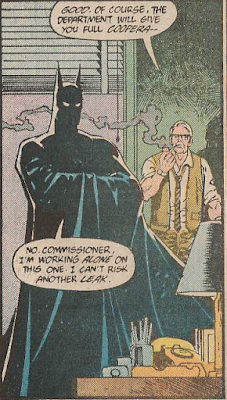 |
| Next Week... The Spawn of Todd McFarlane! |







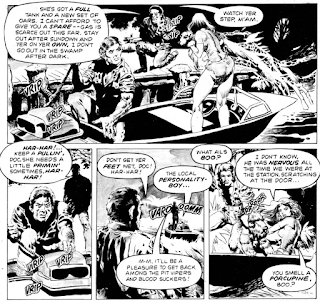
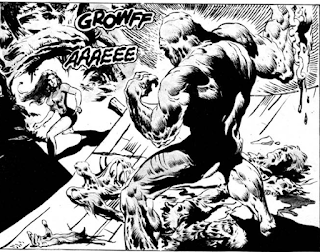

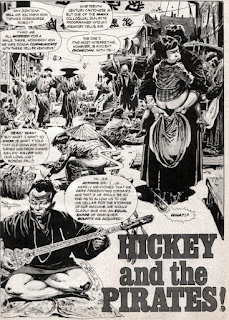



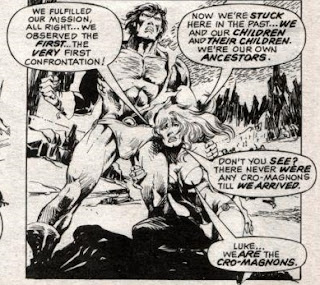

3 comments:
Time to play ‘Spot That Swipe’ : Mayo’s raggedy-panties lady in the boat is from Frazetta’s ‘ESCAPE ON VENUS’ cover painting.
Cover Complaints Department — it’s not that these covers are ‘Bad’, just kinda underwhelming. I think I was spoiled by the consistently moody excellence of the Sanjulian/Enrich/Kelly Years. Is this the first Maroto painting to grace a Warren mag? I had a relatively poor opinion of Penalva’s cover art based on his Warren work, and this EERIE is a prime example. Again, not ‘Bad’, just kinda ‘Basic’, and I don’t love that simplistic, blinding blue background. Maybe he intentionally left plenty of negative space for cover copy but the editorial team couldn’t be bothered. A few years later, his lush, dynamic covers for the ‘Doc and Raider’ series of Adult Westerns caught my eye, and I started collecting them. I must have thirty or forty of the things now.
‘Dime Novel Hero’ gets my vote for Best Art and Story of the month. Delightful! I came across the MONSTER TIMES version years later, recognized the Lone Ranger and Tonto twist ending and wondered ‘Who ripped off whom?’ Didn’t realize Cuti had written both.
b.t.
Wow, hard to believe you've made it through a hundred of these posts. Congrats! Maroto provides a fairly strong cover for this issue (sans the hair, which in contrast to everything else is just a single flat color). Surprised he didn't do more for Warren, especially around this era with Enrich, Sanjulian and Kelly's output either diminished or gone entirely. I think he does just one more, an upcoming Vampi cover. "Dime Novel Hero" was also the best story for me, although as someone who wasn't familiar with the Lone Ranger it took me several times to understand the ending when I first acquired this issue. Severin's story had a simple premise but was quite a good one. I was more pleased with "The Summoning" then you were; I was happy that Jones eschewed the cliché twist ending of revealing the monster was the guy's kid when that was already quite obvious. "Shrivel" was fairly good as well. "Always Leave Them Laughing" I had a hard time liking because the premise was just that ridiculous. "The Sign" confused me a bit as well and "Night Life" was quite forgettable.
I usually dread The Rook stories and left this for the last story I read in the issue, but this time The Rook actually ended up being pretty good. Nice to see Jose Ortiz get a try at doing the character, something I don't recall him getting many opportunities for. It continues to blow my mind how obsessed Dubay is with making the IRS a factor in his stories. That aside this was a pretty good tale. I was fully expecting it to be a two parter and pleasantly surprised that it wrapped up when it did. Nothing too special about "The Horizon Seekers" which I recall being a fairly lengthy series with at least 6 - 7 parts, maybe more? I fondly remember some parts of this series, but nothing from this segment. "The Shining Sea" was fairly good for me too, beyond having the same problem about having a hard time taking a dolphin headed character seriously. I was quite pleased with the twists and turns in "Harrow House", the best Bruce Jones story in a while. I too had a very hard time taking "A Crack in Time" seriously with the barbarian looking time traveler. Is this the only type of character Pablo Marcos knows how to draw? Somehow I didn't expect the ending twist though, so credit to the writer.
Thank you both for your comments! I kind of liked the covers this time around, perhaps because they're more "standard comic book" covers than we're used to. I had not made the connection with DuBay and the IRS, but I see what you mean. I wonder what was going on?
Post a Comment